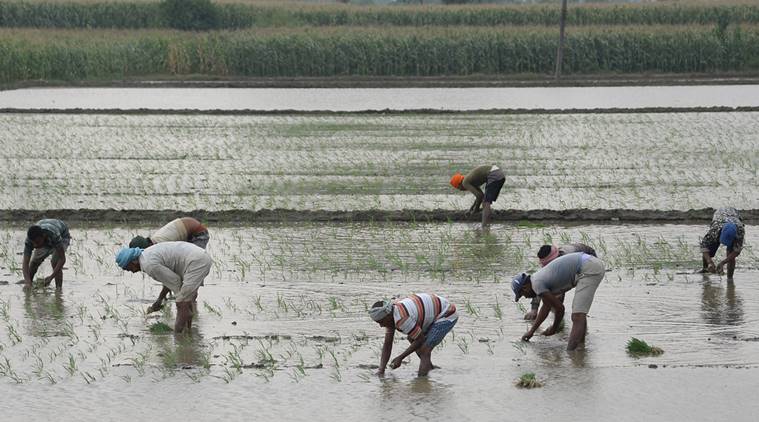 Pointing towards Hardeep, who is sitting on a cot, Moti Lal says, “I am the third generation of my family doing paddy transplantation work in Punjab. My sons have also joined me.” (Representational)
Pointing towards Hardeep, who is sitting on a cot, Moti Lal says, “I am the third generation of my family doing paddy transplantation work in Punjab. My sons have also joined me.” (Representational)
Moti Lal is 60 years of age, and has six daughters and three sons. Hailing from Raibari Mahuwa village of Bihar’s Paschim Champaran district, he toils 17 hours a day transplanting paddy in the fields of farmer Hardeep Singh in Ludhiana.
Pointing towards Hardeep, who is sitting on a cot, Moti Lal says, “I am the third generation of my family doing paddy transplantation work in Punjab. My sons have also joined me. Mera beta Bikas bhi sath aaya hai…chauthi pidi (my son Vikas, the fourth generation, has also come along.”
Moti is part of a group of 25 migrant labourers who have come to Mansuran village on Saturday morning via bus and will be staying here for a month to earn. “This Covid season, while lakhs of migrants have gone back to their villages, this group is busy in fields. Punjab aaye bina hamara guzara nahin…gaon mein jitna kamao kharch ho jata hai…yahan bach jaata hai…Corona ka koi dar nahi…bhookmari se dar lagta hai (We cannot manage without coming to Punjab. In the village, whatever we earn is spent. But we save money here. We have no fear of coronavirus, it is hunger that we fear more),” he says.
Sunday was the group’s first work day in the fields of Hardeep Singh. Moti Lal says, “None of us has gone to school. Even our children are working in the fields instead of going to schools.”
Moti Lal and another villager Ravinder Kumar also cook for the group. “Sab ko baraabar ka hissa milega, tau kaam bhi karna padta hai…roti bana ke khet mein jaate hain (everyone will get an equal share, so we have to work as well. After cooking food, we go into the fields),” said Ravinder, clad in a dark pink shirt and brown pants folded to his knees. Ravinder too has seven children.
Hardeep, the farmer, said, “We had a tie-up with a contractor and we called him up, so he arranged all 25 of them to work here. He brought them to the fields Saturday, we paid Rs 2000 per head to the bus driver as transportation charges and it will be deducted from their wages. Before lockdown they had come to Haryana to work in a brick kiln and had to come to Punjab in paddy season, but they got no work in Haryana this time and hence came to Punjab.”
He added, “Our village has decided to pay them Rs 4,000 per acre and they will transplant a minimum 200 acres in 20- 25 days as a group of three persons transplanting an acre in a day. This way they can earn upto Rs 8 lakh in total and if divided it comes out to Rs 32,000 per person.” Hardeep has 25 acres of land on contract while the rest will be of other villagers of the same village.
However, here is the catch, not only will Rs 2,000 be deducted as transport charges from each worker’s wages, they have to manage food charges on their own. The work sometimes get extended as well, to a month depending upon weather. Hence, workers said that after all expenses, they save not more than Rs 15,000-16,000 a paddy season as food becomes a major portion. “Some farmers provide us ration, but in a contract, we manage our food on our own,” said Badri Shah, another migrant labourer.
Mahant Chaurasia, another worker, said, “We eat roti twice a day. We have a hearty meal of dal-chawal for dinner. During the day, we eat less or else we cannot work.”
Moti and Ravinder are popularly called as langri by the group as they cook meals for them, and kitchen area is provided by farmers. “We start working in the fields by 5 am and work till 6 pm transplanting paddy. After that we uproot the paddy seedling from other sections of the field readied by farmers already and this work continues till 10 pm. These seedlings are then transplanted the next day, in another area. Hence, we work almost 17 hours a day. Most part under the sun and standing in water.”
Ravi Shanker Chaurasia, another worker, said, “At times our hands and legs develop skin infection, but we carry medicine along. We also know which herbs in the area can help us. We take rest for some time, in case some itching happens and then we are back in fields. Sometimes our backs hurt as our work involves bending over the fields, but we are used to that now.”
At night, the group enjoys bhojpuri and punjabi music while eating dal chawal, sometimes even chicken or fish.
Back home in Bihar, their wives earn for themselves by working in paddy fields and rear dairy animals as well.
The group started working on the fields immediately after arriving on Saturday. No medical examination has been done till now. They will be staying at a place arranged by farmers of the village. “From fields to the place of stay and back to fields, it is a natural quarantine. They have no time to roam around here or there,” said Darbara Singh, a 65-year-old farmer in whose fields this group will work soon after.